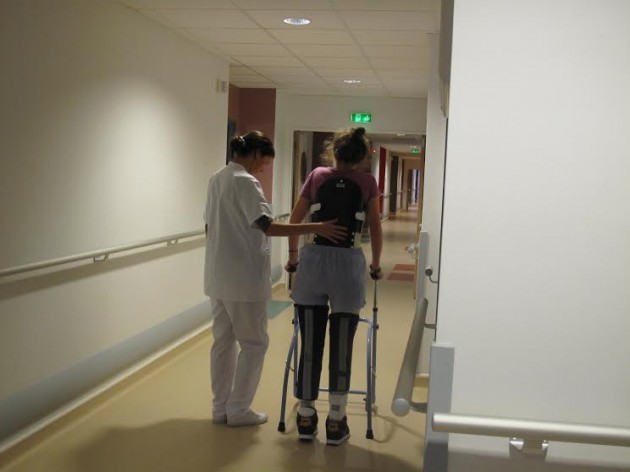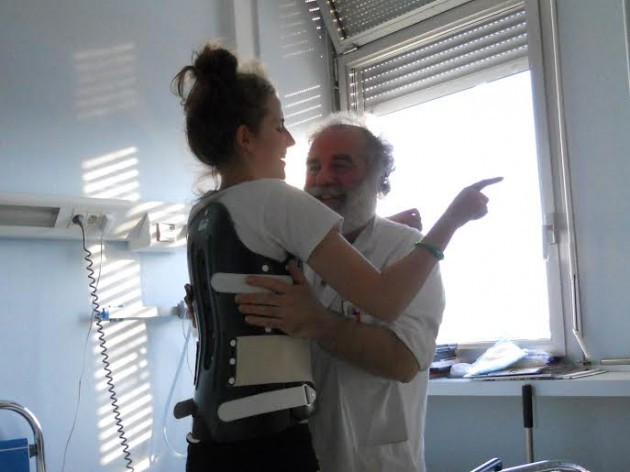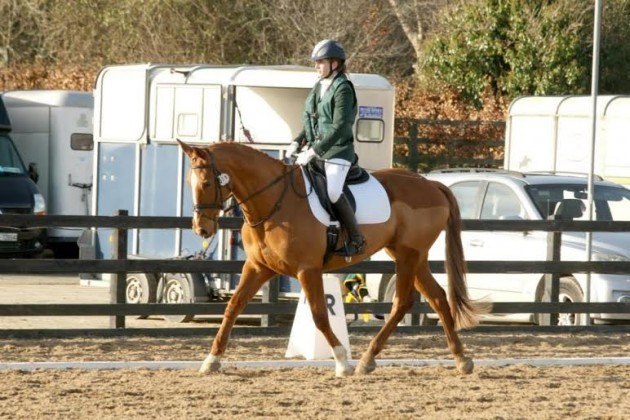EMMA CAHILL IS nothing if not determined.
From the very beginning, it became apparent that realising her dream of becoming a top class athlete in her field would be a bigger challenge than most.
The Dublin showjumper’s parents, for one, were dead set against her following this notoriously risky path.
“They don’t have a horse-riding background and they’ve been against it since the very first day that I was drawn to it,” she tells The42. “It took about five years of negotiating with them before I got my first riding lesson.
“They’ll admit themselves, they were hoping it would scare me off and that I wouldn’t want to do it anymore. I started when I was about 10 in a riding school and went from there. I can’t imagine life without it now. But they don’t understand why I would take the risk.
“My dad has once had a phone call where I had a concussion and he had to come and get me and pick up my car. That was hard enough for him, so a phone call when I was abroad, saying ‘she’s in hospital, we don’t know how bad it is,’ it’s every parent’s worst nightmare.”
Four years ago, Emma’s father received that very call. His daughter had been riding a young horse that unexpectedly panicked and deviated from normal route during an event.
“I kept really still and stayed calm to try to not make the situation worse,” she recalls. “But then she reared up [where a horse stands solely on its hind legs] and I fell straight off the back.
“I tried to roll out of the way because I thought she might fall on me, but I couldn’t move — I was winded. I remember thinking ‘okay, a guy holding her is going to stop her from falling on me,’ but it did fall back on top of me. I remember closing my eyes at that stage and thinking: ‘Oh, this is going to hurt.’
“[The horse] got straight up, she was absolutely fine, but I felt like there was a knife in my back and that it was all on fire from the waist down. I knew straight away that it was really serious. It got out of control very fast.”
This life-altering accident left Emma with a crushed spine. She was paralysed from the waist down and doctors said she’d never walk again.
“When they told me, it was a bit surreal. I didn’t believe it and I didn’t think it would be the case, and I thought I’d prove them wrong. I’ve spoken to a lot of people who have had the same thing said to them and they’ve had a similar reaction.
“It has nothing to do with whether they will or won’t walk again, it’s that feeling of — this can’t be happening, it’s not real, things can only get better.”
(Emma walks again following her accident)
However, fortunately, there was some light at the end of the tunnel following this traumatic experience.
“Doctors usually say that you won’t walk when it’s a complete [spinal cord] injury. That’s when there’s no connection left through the nerves in your spine. In my case, it was incomplete, with the tests not finding a definitive result for two or three weeks.
“They weren’t able to get a [conclusive answer] — all the signs were showing it was complete, but luckily it wasn’t. People with complete injuries tend not to walk again or recover, but with incomplete injuries, there’s a chance [of recovery].”
Nevertheless, despite this positive news, Emma still faced a long, painstaking road to recovery. Initially, returning to the world of showjumping was the least of her concerns, and simply standing upright was impossible without assistance.
“I wasn’t allowed to move my back,” she remembers. “It was too fragile — like a broken arm that isn’t in a cast yet. I couldn’t see my feet or legs. I couldn’t see the damage that was done.
“I was sharing a hospital room and I’d never seen the lady in the other bed’s face. I wasn’t able to see what was going on and to see the world as a big picture — you’re just looking at the ceiling all the time.
“They put in what was like a table that you tilt up. They make you stand and you’re all strapped into it. I was able to look out the window and see the snow, to look down the room and see the other lady and wave at her and see her face.
“I felt really nauseous every time they stood me up, but you could feel human and on the same level as everyone else, rather than being the person lying on the bed looking up at everyone.”
Yet despite facing this extraordinarily difficult situation, Emma was able to remain somewhat optimistic. Partially inspired by her physiotherapist, the Dubliner set a number of goals for herself, including riding again and driving within six months. Nonetheless, the physiotherapist, who Emma says resembles “Santa Claus,” balked at these ambitions, adding fuel to her fire in the process.
“He sort of laughed at me and said ‘did you not hear the doctor when he said you wouldn’t walk again,’ and I said: ‘Well that’s your problem, you’re going to fix that, these are my goals.’ He turned around and called me the ‘Little Mermaid’ to explain that I couldn’t use my legs and I couldn’t walk, and I called him ‘Santa Claus’ and said: ‘After Christmas, I want to walk again.’
(Emma receives assistance from her physiotherapist while in hospital)
However, he soon realised that Emma was not going to give up on her goals easily.
“We had a bit of a laugh about the whole thing, but then he realised I was very serious about what I wanted. When people are in hospital, as you can imagine, there’s a lot of depression. So every time someone received a physio session, he would come back and give me an extra session that day.
“He was the one who brought the tilt table into my bedroom — it had cobwebs all over it, it didn’t get used very much, but he was the one who got me on it and got me believing that we can do this if we work hard enough.
“Thankfully [I discovered that] the injury was incomplete and I felt a twinge in my legs… So it was with him that I took my first steps.”
She continues: “He was also really vital in giving me something to hang on to, because normally you’re in bed for 23-and-a-half hours a day and you get half an hour upright for physio. Our record was four hours a day with me upright — whereas other people were just refusing physio. That gave me something to work towards.”
In a further bid to aid her recovery, Emma tried to stay as active as possible despite being confined to a bed for most of the day. Much time was spent “wriggling” around the bed — dancing and moving as often as possible while listening to her iPod.
She adds that an important part of her recovery was learning to accept that she might, in fact, not recover.
“I originally made a plan B. I rewrote my life story in a wheelchair and thought of what I could do from a wheelchair, so that was quite intense.
“I had plans to cope — I thought: ‘I’ll wear high heels every day,’ as my feet wouldn’t hurt. I thought of teaching horse-riding instead of riding myself.
“But then something inside me said that that wasn’t good enough. I pushed for the walking and even that wasn’t good enough. I walked three steps and everything hurt, and I was going to keel over.
“I just kept the thought that nothing was ever good enough, and it’s gotten me this far. I never thought I would walk perfectly, but I thought until I felt like myself again, it wasn’t good enough and I had to keep at it.”
Asked what advice she would give to other athletes who suffer life-altering injuries, she emphasises the importance of being able to “listen to your body and make peace with it”.
“I had to make peace with it and walk away if it hurt too much. That way, I was able to take it slowly and go at a pace that was sustainable. Whereas if I’d gotten back on thinking it has to be perfect, I would have broken something… It’s a long-term plan, rather than a short-term push, to recover.”
Four years on from the accident, aged 26, Emma is back on the saddle again. It was an extremely taxing process to reach this point, of course — and not only in a physical sense.
(Emma Cahill on Capital Coin at the Eastern Region Dressage competition at Boswell, in January 2015)
Extensive hospital bills, in addition to the exorbitant cost of simply competing on a regular basis in showjumping, means she had to make financial sacrifices too.
Her mother sold her jeep to raise funds for her to compete while her father gave up use of his van when required. Fortunately though, last year she was selected as a Nissan Generation Next ambassador, which meant she was allowed use of a complimentary Nissan X-Trail for one year.
She is also hoping her alliance with Pledgesports — a crowdfunding initiative set up last year for talented but financially neglected Irish athletes — will help her raise the necessary funds to compete at the highest level.
Furthermore, she even works in a full-time job while competing intensively in her off time.
“The people I work for have been very understanding,” she says. “They allow me to work remotely through Skype and telephones. They don’t question it too much. And in return, the only holidays I would take are for competitions and training.
“I would work most weekends for a couple of hours, and when I get home. They’re understanding with me when I need to finish work early to go training and I give it back when I get home in the evenings.”
Her job involves selling compression socks, working with “90%” of Premier League teams among others. Nevertheless, her passion for showjumping does not extend to football.
“I met [Chelsea defender] John Terry a few weeks ago and didn’t know who he was, I had to ask him,” she laughs.
And despite her determined nature, she still concedes that qualifying for the 2016 Rio Paralympics, or the upcoming European Championships in Deauville this September, constitutes a “long shot”.
Currently ranked 174th in the FEI Para Dressage Individual World Rankings, having only taken up Para Dressage in 2013, Emma admits to at times feeling less than assured about the prospect of going up against her far more experienced rivals.
“Every time I think I’m confident and comfortable, something changes and I realise what a big undertaking it is.
“Hopefully, all the pieces will fall into place at the right time. I call it pony dancing — I have to learn all the dance moves, I’m on a strange new horse in Belgium [where she's currently based], trying to get him to adjust. It’s very different — how I ride and how I adjust — compared with before.”
Indeed, Emma says she often has to remind herself not to expect instant miracles when competing.
“Last year, I had an international trial that I botched completely,” she says. “I rode while feeling very tense and the pressure just got to me. It didn’t go the way [I hoped it would]. All the preparation and training was there, it just didn’t happen for me and I got really upset.
“But then I remember thinking: ‘Okay, it’s not life or death, you’re in this for yourself.’ You really have to take a step back and switch off the pressure.
“When making my international debut, instead of thinking I had to beat everybody and had something to prove, I told myself it was my debut, it was a learning experience, don’t take it too seriously.
“And it showed in the results — I did a lot better when I took the pressure off myself. It didn’t matter if I did badly, I was here for a reason. Whereas if I’d gone in thinking I had to beat everyone that had 20 years’ experience on me, it would have blown up in my face.”
And this relaxed philosophy is one that Emma routinely embraces, not just in sport, but in life in general. Irrespective of what the future holds, she will have no fear, no regrets. Horse racing will always be a risk — but not one she would ever want to live without.
“If you go down through the hospital ward, there are hundreds of patients who ended up there for different reasons. Very few of them were doing anything particularly risky — some of them were driving to work, some were walking their dog, some were walking down the stairs… They weren’t taking life-altering risks, it just happened to them.
“So I’ve sort of made peace with the risk — if I have an accident again, it might be off a horse or it might be falling down the stairs, but at least if I’m horse-riding, I’m happy, whereas if I didn’t do anything scary, I still could end up in a hospital bedroom.”
For more information and to donate to Emma’s Pledgesports campaign, click here.



